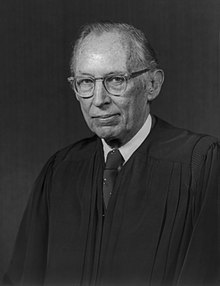Lewis F. Powell, Jr.
American jurist (1907–1998); US Supreme Court justice from 1972 to 1987
Lewis Franklin Powell, Jr. (19 September 1907 – 25 August 1998) was an Associate Justice of the Supreme Court of the United States. He developed a reputation as a judicial moderate, and was known as a master of compromise and consensus-building. He was also widely well-regarded by contemporaries due to his personal good manners and politeness.

Quotes
edit1970s
edit- Preferring members of any one group for no reason other than race or ethnic origin is discrimination for its own sake. This the Constitution forbids.
- Regents of the University of California v. Bakke, 438 U.S. 265 (1978).
1980s
edit- The Court is perhaps one of the last citadels of jealously preserved individualism. For the most part, we function as nine, small independent law firms.
- Los Angeles Times (10 September 1981).
- I know of no other nation in history that deliberately fought a major war with no intention or effort to use its full available forces to carry the war to the enemy's heartland: in Vietnam the capability to do so clearly existed. The effect of this strategy on the attitudes of our own people, and on foreign attitudes toward America, are well known. Less well known are its consequences in Southeast Asia, which include the exodus of the boat people from Vietnam and the Communist genocide in Cambodia.
- Foreword (dated November 1987) to John Martin Taylor's General Maxwell Taylor: The Sword and the Pen (1989), p. xiv.
- It was abundantly clear from his letters that, virtually to the end, he remained deeply interested in national and world events. Yet he never ceased to engage in self-deprecating humor. I have a file containing a decade of correspondence with my dear friend. It is a file that I will keep. Max's death on April 19 was not unexpected and I am sure he would have viewed it as merciful. At the moving funeral service at Fort Meyer, Ambassador Philip Bonsal, a respected diplomat and longtime friend of the Taylors', spoke eloquently of General Taylor's "example", and correctly said that his friendship would remain a constant treasure in the lives of all of us who knew him. His younger son Tom's superb tribute brought tears to the eyes of most of us. He emphasized the closeness of the Taylor family- a closeness not often found in the lives of the world's great leaders. It typifies the mind and spirit that I was privileged to know. Maxwell Taylor's place in history will be a large one.
- Foreword (dated November 1987) to John Martin Taylor's General Maxwell Taylor: The Sword and the Pen (1989), p. xiv.
1990s
edit- I think I probably made a mistake in the Hardwick case... I do think it was inconsistent in a general way with Roe. When I had the opportunity to reread the opinions a few months later, I thought the dissent had the better of the arguments.
- At NYU Law School, (18 October 1990); after retirement from the Court, reflecting on his vote in Bowers v. Hardwick to uphold laws making homosexual sex a crime for which people could be imprisoned. Reported in Nat Hentoff, "Infamous Sodomy Law Struck Down", The Village Voice, 22 December 1998.